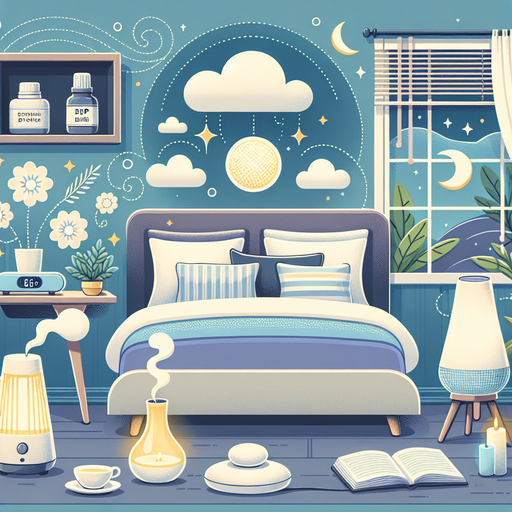Sleep is essential for our physical, mental, and emotional well-being. Yet, for many of us, getting a good night's rest can be a struggle. We toss and turn, our minds racing with worries and to-do lists, and we wake up feeling exhausted. But fear not, dear reader, for there are ways to improve the quality of your sleep and wake up feeling refreshed and rejuvenated. In this article, we will discuss the top 5 ways to sleep easier, so you can bid farewell to restless nights and hello to a peaceful slumber.
1. Create a Relaxing Sleep Environment
The first step to sleeping easier is to create a relaxing sleep environment. Your bedroom should be a sanctuary, a place of peace and tranquility. Start by decluttering your space and removing any distractions such as electronics or work-related items. Keep the room cool, dark, and quiet, as these are the optimal conditions for a good night's sleep.
Invest in a comfortable mattress and pillows that support your body and align your spine. Consider using blackout curtains or an eye mask to block out any unwanted light. You can also use white noise machines to drown out any outside noise that may disturb your sleep. By creating a calm and comfortable sleep environment, you are setting the stage for a restful night's sleep.
2. Stick to a Sleep Schedule
Our bodies thrive on routine, and our sleep-wake cycle is no exception. Going to bed and waking up at the same time each day can help regulate your body's natural sleep patterns. Try to establish a consistent bedtime routine, such as taking a warm bath, reading a book, or practicing relaxation techniques like meditation or deep breathing.
Avoid caffeine, alcohol, and heavy meals close to bedtime, as these can interfere with your sleep. Instead, opt for a light snack that contains sleep-inducing foods like bananas, almonds, or cherries. By sticking to a sleep schedule, your body will become accustomed to a regular sleep pattern, making it easier for you to fall asleep and wake up feeling well-rested.
3. Engage in Relaxation Techniques
We live in a fast-paced world, and our minds are constantly bombarded with information and stimuli. This can make it difficult to switch off and relax, especially when we are trying to sleep. Engaging in relaxation techniques can help calm the mind and prepare the body for sleep.
Some effective relaxation techniques include deep breathing, progressive muscle relaxation, and guided imagery. These techniques can help reduce stress and anxiety, improve sleep quality, and promote relaxation. You can also try using essential oils, such as lavender or chamomile, to create a calming atmosphere in your bedroom.
4. Limit Screen Time Before Bed
In today's digital age, we are surrounded by screens - phones, laptops, TVs, tablets, you name it. While technology has made our lives easier in many ways, it can also interfere with our sleep. The blue light emitted from screens can suppress the production of melatonin, the hormone that helps control our sleep-wake cycle.
To sleep easier, limit your screen time at least an hour before bedtime. Instead, engage in relaxing activities like reading, listening to calming music, or journaling. If you must use your phone or laptop, consider using a blue light filter or downloading an app that reduces blue light emission. By limiting screen time, you are giving your brain a chance to wind down and prepare for sleep.
5. Seek Professional Help if Needed
If you have tried all the above methods and are still struggling to sleep easier, it may be time to seek professional help. Chronic sleep issues can be a sign of underlying medical conditions, such as sleep apnea, restless leg syndrome, or anxiety disorders. Consult with your doctor to rule out any underlying issues and discuss potential treatment options.
You can also seek help from a sleep therapist or counselor who can provide you with personalized strategies to improve your sleep. Cognitive-behavioral therapy (CBT) has been proven to be an effective treatment for insomnia, and it focuses on changing negative thoughts and behaviors that may be contributing to your sleep problems.
Conclusion:
Sleep is vital for our physical, mental, and emotional well-being. By creating a relaxing sleep environment, sticking to a sleep schedule, engaging in relaxation techniques, limiting screen time before bedtime, and seeking professional help if needed, you can improve the quality of your sleep and wake up feeling refreshed and rejuvenated. Remember to be patient and consistent, as it may take some time to establish healthy sleep habits. Sweet dreams!


